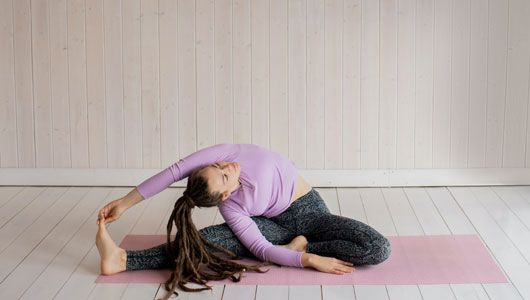
Physical Self-Care
Self-care is a trendy topic online and in social media. Most of us have heard about practicing self-care, but what does the term mean, exactly? Self-care can refer to emotional, physical, financial, mental, and social aspects of your life, and can have a significant impact on your day-to-day happiness.
Physical self-care is one of the most frequently mentioned types of self-care, and has become synonymous with health and well-being.
What Is Physical Self-Care?
Physical self-care means paying attention to your physical health and making it a priority. Many of us think of physical self-care as going to the gym and eating less sugar, but there's much more to it. Let's look at some of the most important examples of physical self-care, and how you can put them into practice in your own life.
Why Is Physical Self-Care Important?
Practicing physical self-care can help reduce the pressures of work, relationships, and family life, and restore your body and mind to a healthier "baseline." Overwork, lack of sleep, and focusing on the needs of others while neglecting ourselves can result in negative consequences, including:
- Depression
- Resentment
- Anxiety
- Burnout
- Exhaustion
- Physical illness
Studies show that a regular practice of physical self-care can create dramatic improvements in many areas of your life, and can:
- Improve mental health
- Boost concentration
- Lower stress
- Reduce feelings of frustration and anger
- Make you feel happier and more fulfilled
- Reduce the risk of heart disease, cancer, and stroke
- Increase feelings of connection with our emotions
Clearly, physical self-care has effects that go far beyond the body, and impacts all areas of our lives. In fact, self-care is best practiced with an awareness of the other parts of ourselves that need care, including our spirits, emotions, and intellect.
Physical Self-Care Examples
Some of the main examples of physical self-care include:
Healthy Eating. Healthy eating refers to an optimum diet of fresh vegetables, protein like fish, fresh fruits, fermented dairy products, and some whole grains for those who aren't carbohydrate sensitive. Processed foods like potato chips, crackers, soda, donuts, cookies, and candy should be eaten only on occasion.
Studies show that foods made with flour, including whole wheat flour, raise blood sugar and tell the body to store fat. White rice, bread, and to a lesser degree pasta have a similar effect and should be eaten less often.
Sleep and Rest. Sleep is one of the most overlooked aspects of physical self-care. Sleep impacts everything from weight to immunity to mood and mental health. Our brains heal during the night, and we recover from the day's activities while sleeping. If you consistently get too little sleep, you're at higher risk of obesity, viral infections, cancer, and even dementia.
Every person has slightly different sleep needs, but most of us need between seven and nine hours every night. To determine how much sleep you need, go to bed and wake up without an alarm for a few days in a row. Keep track of how many hours it takes for you to sleep and wake up feeling refreshed.
Physical Healing. Part of physical self-care is taking the time to heal from illness or injury. Use sick days if you need them. If you're feeling ill, take a break or go home early. When you allow yourself to rest, your body heals faster and you feel less stress.
Proper physical healing can mean taking the time to get enough sleep, following a doctor's recommendations, eating more nourishing foods, and gradually moving your body as your strength and mobility improve.
Exercise. Physical exercise improves both physical and mental health. People who exercise regularly are less likely to develop chronic diseases and report more stable moods. Regular movement also improves sleep quality and reduces stress levels.
Exercise can refer to brisk walking, strength training, running, biking, or other activity that raises your heart and breathing rates. If you suffer from chronic pain or fatigue, check with your doctor before starting a gradual exercise or strength training routine. Start small, and gradually increase your activity level.
Sexual Self-Care. Sexual self-care includes talking about sexual issues with your partner, practicing safe sex, and getting regular medical exams. You may find that sexual self-care helps you feel better about yourself, which will help you feel better about your relationship.
Sexual self-care is important even if you don't have a partner or are asexual. Part of sexual self-care is sexual fulfillment, whether you experience it by yourself or with a partner. Asexual folks may think of sexual self-care as self-care that involves physical pleasure, but isn't necessarily sexual for them.
Reducing Certain Habits.
Physical self-care is as much about what you choose not to do as what you do. Habits to reduce or eliminate might include:
- Smoking and vaping
- Disordered eating such as binging, stress eating, or eating too little
- Not moving your body enough
- Over or undersleeping
- Consuming too many stimulants like caffeine
- Taking drugs that harm your body or put your safety at risk
- Not listening to your body when it needs to rest, eat differently, or move more
- Compulsive exercising
- Igoring symptoms of potential problems, such as unusual fatigue, lack of appetite, weight loss, or anything that is "new to you," like lumps or headaches.
Try to understand the motivations behind your bad habits. Most of us indulge in unhealthy habits because we gain a payoff of some kind. Do your habits distract from uncomfortable emotions or boredom? Do you feel disappointed or unfulfilled in some area of your life?
Mental health is a key part of physical self-care. Addressing the "why" behind destructive behavior can help you overcome it and replace it with a physical self-care plan. Meditation and therapy can help you examine why you rely on certain behaviors and make choices that work better for you.
Reducing habits that don't serve you is often easier when you replace them with something positive and beneficial to your health. Try focusing on a moderate exercise routine to release natural relaxing endorphins.
Eat non-processed food that nourishes your body and gives you energy without blood sugar spikes. Minimize alcohol and use of drugs and focus on getting adequate sleep.
Physical Self-Care Ideas
Looking for some self-care ideas you can practice today? Here are some our favorites:
- Take a walk outside every day. Even a short stroll in the fresh air is good for your mind and body, and can help reduce stress.
- Go to bed at the same time every night. A consistent bedtime can help regulate your sleep cycles and result in deeper, more refreshing sleep.
- Meditate. Just 20 minutes of meditation once a day has been shown to increase feelings of happiness and fulfillment as well as control over one's life. It can also help reduce blood pressure and heart rate, and make it easier to fall asleep.
- Choose one healthy activity a day. To get in a physical self-care mindset, choose something new and healthy to do every day. Try green tea, take time out to stretch and breathe, create a stand-up desk from boxes to reduce the time you spend sitting, or take a bath at the end of the day to relax and recharge. A daily walk is one of the best ways to keep in touch with your body and reduce feelings of anxiety.
- Practice yoga. Even just a few poses a day can help you take time to breathe, listen to your body, and stretch your muscles. Brief yoga breaks are perfect if you work from home or take care of children, and can help you de-stress periodically throughout the day.
- Don't put off medical care. Doctor visits and tests can be stressful, but are an important part of controlling your own physical health. Don't be afraid to get more information so you can understand better how your body works and what it needs. Schedule blood tests, checkups, mammograms, and colonoscopies, and follow through when the time comes. Preventative medicine is a crucial part of physical self-care, and can help keep you healthy for a long time to come.
- Honor your sexual needs. Part of physical self-care is understanding and respecting your sexual needs. This may mean taking time for solo play, sex with your partner(s), or reserving sex for times when you're able to relax and focus. If you're asexual or have a lower libido, sexual self-care can mean having less sex or no sex at all, and/or finding a partner who accepts your sexuality without pressure or judgment.
